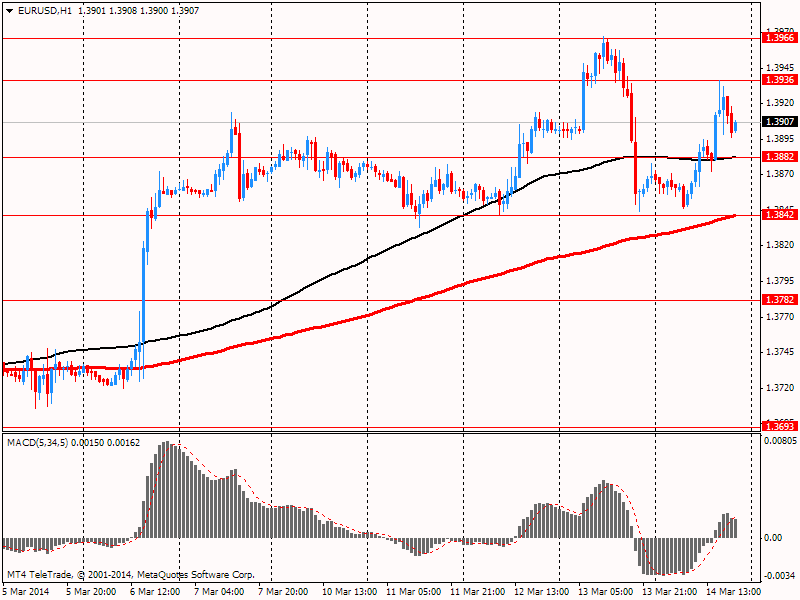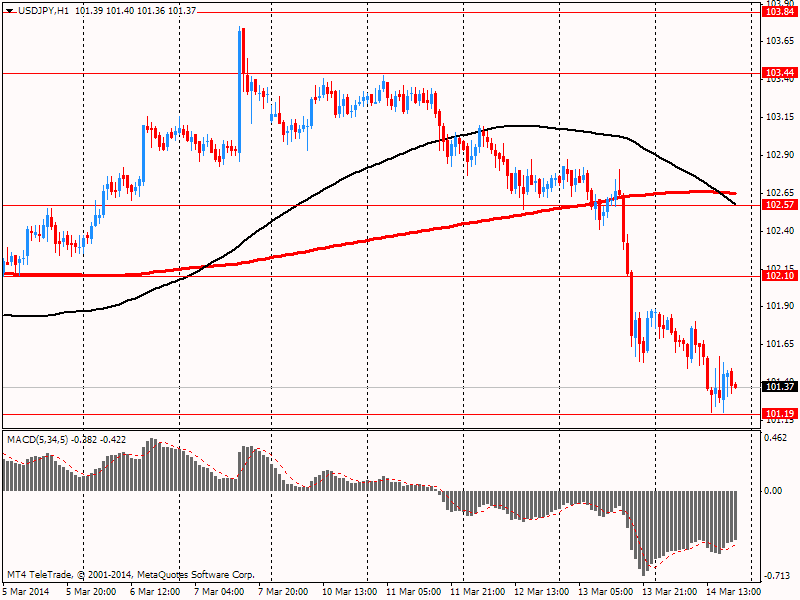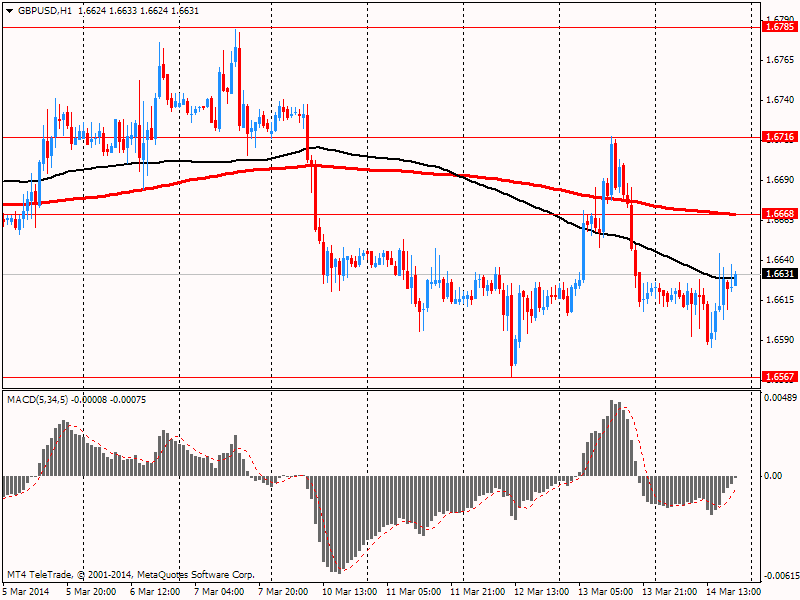Notícias do Mercado
-
18:20
American focus : the euro has grown significantly against the U.S. dollar
The dollar fell against the euro due to risk aversion amid renewed concerns about the Ukraine and China. Also, the pressure on the currency was weak U.S. data . One report showed that the producer price index, which measures changes in prices of everything from food to energy and transport services decreased by 0.1 % compared with the previous month . Economists had expected a 0.2 % rise . Index for January remained unchanged at 0.2% growth . The index rose 0.9% in February after an annual increase of 1.2% in the previous month .
One more preliminary data , which were presented Thomson-Reuters and the Michigan Institute showed that in March, U.S. consumers feel more pessimistic about the economy than was recorded in the last month. According to reports, in March preliminary index of consumer sentiment fell to 79.9 compared with the final reading for February at 81.6 . It is worth noting that according to the average estimates of experts , the index had to grow compared with the February value to reach 81.9 .
The yen rose against the U.S. dollar , which was due to concerns about events in Ukraine and signs of weakness in the Chinese economy . Note also that the present U.S. Secretary of State John Kerry met with Russian Foreign Minister Sergei Lavrov in London. Lavrov said that Russia will decide on the Crimea only after the referendum , said U.S. Secretary of State John Kerry . " Foreign Minister Lavrov made clear that President Putin is not ready to take a decision before the referendum , which will be held on Sunday," - said John Kerry . The head of the State Department stressed that the U.S. considers the referendum unconstitutional Ukrainian and international law.
Traders also noted the ongoing concerns about the state of China's economy after a series of poor economic performance .
Pound rose against the dollar , while returning all previously lost ground. Impact on the dynamics of the reported data on the trade balance , which were worse than expected , as well as the words of the deputy governor of the Bank of England's Monetary Policy Charles Bean . Bean noted that further deterioration of foreign income could harm the UK pound. According to Bean , the recent decline in net investment income Britain is unlikely to completely unfold . "In my opinion , the situation may recover slightly , but she did not return to the levels before the financial crisis . Undoubtedly, due to the negative net balance we vulnerable , making a sharp depreciation of the pound is more likely that if investors lose confidence in the economy . We saw it happen in emerging markets , "said Bean .
-
13:55
U.S.: Reuters/Michigan Consumer Sentiment Index, March 79.9 (forecast 81.9)
-
13:46
Option expiries for today's 1400GMT cut
USD/JPY Y101.50, Y101.70, Y101.85, Y101.95, Y102.00, Y102.20, Y102.40, Y103.00, Y103.50, Y103.60
EUR/USD $1.3825, $1.3845, $1.3900, $1.3910, $1.3915, $1.3990
GBP/USD $1.6530, $1.6575, $1.6600, $1.6630-35, $1.6640-50, $1.6700, $1.6710
EUR/GBP stg0.8175, stg0.8195, stg0.8210, stg0.8220, stg0.8275, stg0.8350
EUR/CHF Chf1.2185
AUD/USD $0.8900, $0.8925, $0.8950, $0.8970-75, $0.9000, $0.9015, $0.9020, $0.9050, $0.9070-75, $0.9080
USD/CAD C$1.1050, C$1.1100, C$1.1150, C$1.1175, C$1.1200
-
13:00
Orders
EUR/USD
Offers $1.4000, $1.3967/75, $1.3920/25, $1.3900/10
Bids $1.3820-00, $1.3770/60, $1.3710/00
GBP/USD
Offers $1.6720/25, $1.6640-50
Bids $1.6595/90, $1.6555/50, $1.6510/00
AUD/USD
Offers $0.9150, $0.9080, $0.9050
Bids $0.8950, $0.8910/00
EUR/JPY
Offers Y142.90/00, Y142.50, Y141.90/00, Y141.50
Bids Y140.55/50, Y140.00, Y139.50
USD/JPY
Offers Y103.00, Y102.50/55, Y102.00
Bids Y101.50, Y101.00, Y100.50
EUR/GBP
Offers stg0.8415/20, stg0.8390/405, stg0.8380
Bids stg0.8320/15, stg0.8280/75
-
12:30
U.S.: PPI, m/m, February -0.1% (forecast +0.2%)
-
12:30
U.S.: PPI excluding food and energy, m/m, February -0.2% (forecast +0.1%)
-
12:30
U.S.: PPI, y/y, February +0.9% (forecast +1.1%)
-
12:30
U.S.: PPI excluding food and energy, Y/Y, February +1.1%
-
09:59
Option expiries for today's 1400GMT cut
USD/JPY Y101.50, Y101.70, Y101.85, Y101.95, Y102.00, Y102.20, Y102.40, Y103.00, Y103.50, Y103.60
EUR/USD $1.3825, $1.3845, $1.3900, $1.3910, $1.3915, $1.3990
GBP/USD $1.6530, $1.6575, $1.6600, $1.6630-35, $1.6640-50, $1.6700, $1.6710
EUR/GBP stg0.8175, stg0.8195, stg0.8210, stg0.8220, stg0.8275, stg0.8350
EUR/CHF Chf1.2185
AUD/USD $0.8900, $0.8925, $0.8950, $0.8970-75, $0.9000, $0.9015, $0.9020, $0.9050, $0.9070-75, $0.9080
USD/CAD C$1.1050, C$1.1100, C$1.1150, C$1.1175, C$1.1200
-
09:31
United Kingdom: Trade in goods , January -9.8 (forecast -8.7)
-
08:15
Switzerland: Producer & Import Prices, m/m, February -0.4% (forecast +0.3%)
-
08:15
Switzerland: Producer & Import Prices, y/y, February -0.8% (forecast -0.4%)
-
07:01
Germany: CPI, m/m, February +0.5% (forecast +0.5%)
-
07:01
Germany: CPI, y/y , February +1.0% (forecast +1.2%)
-
06:25
Asian session: The yen headed for its biggest five-day gain
04:30 Japan Industrial Production (MoM) (Finally) January +4.0% +4.0% +3.8%
04:30 Japan Industrial Production (YoY) (Finally) January +10.6% +10.6% +10.3%
The yen headed for its biggest five-day gain versus the dollar in seven weeks as investors sought haven assets amid persisting tension ahead of a referendum that may lead to Crimea’s secession from Ukraine. The U.S. and Germany stepped up pressure on Russia to back down from plans to annex Crimea.
Goldman Sachs Group Inc. said another round of easing will drive the yen to a six-year low by mid-2014.
The New York-based bank trimmed its 12-month forecast for the Australian dollar, citing a weak domestic outlook. Goldman Sachs cut its 12-month forecast for the Aussie to 80 cents from 85, and the six-month estimate to 82 from 88.
The euro held a decline versus its U.S. counterpart from yesterday, when ECB President Mario Draghi said his forward guidance may help to weaken the euro and lower real interest rates. The bank’s forward guidance states that policy makers will keep official interest rates at present or lower levels for an extended period of time. While the exchange rate isn’t a policy target for the ECB, Draghi said in Vienna yesterday that the currency’s level is becoming “increasingly relevant in our assessment of price stability.”
EUR / USD: during the Asian session, the pair traded in the range of $ 1.3855-75
GBP / USD: during the Asian session, the pair traded in the range of $ 1.6610-25
USD / JPY: on Asian session the pair fell to Y101.60
The European releases get underway from 0700GMT, when the German final February HICP data is set to cross the wire. At 0730GMT, the Bank of France releases the February retail survey. The last European data release for the week is expected at 1000GMT, when the EMU fourth quarter employment data
crosses the wire. UK data set for release at 0930GMT includes the January trade data and the January construction output numbers. Across the Atlantic, the calendar kicks off with the publication of the February PPI at 1230GMT. At 1355GMT, the University of Michigan preliminary Consumer Sentiment data will
cross the wires. Well after the markets close, at 0145GMT, Federal Reserve vice chair nominee Stanley Fischer will deliver a speech to the SIEPR conference in Stanford, California.
-
04:34
Japan: Industrial Production (YoY), January +10.3% (forecast +10.6%)
-
04:30
Japan: Industrial Production (MoM) , January +3.8% (forecast +4.0%)
-


